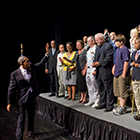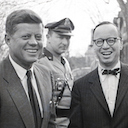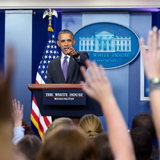
In Defense of Universalism 
The squeamishness of today’s left has turned culture into the political terrain of the right.



The squeamishness of today’s left has turned culture into the political terrain of the right.

In this photograph of Barbara and Beverly Smith of the Combahee River Collective, the framed pictures reflect an endless cascade of black women’s intellectual labor and political action.

It’s time to let go of the belief that changing demographics will bring about a progressive America.

To promote democratic and egalitarian ideals today, we need to break with the anxieties that drove U.S. politics during the Cold War.

Today, we are watched as never before, through surreptitious governmental data collection and through corporate profiles of our desires and habits. Yet we also divulge private matters aggressively, seeking freedom through publicity.

Movements that put forth the rights of the marginalized as a universal cause are the only way to move beyond a superficial politics of representation.
A response to Leo Casey.

Marxist critiques of identity politics place an inordinate weight on the working class as agent of change—and elide its often contradictory history.
A reply to Shuja Haider.

The authoritarian offensive has primarily taken the form of attacks on racialized others. We must fight back accordingly.

When American Affairs talks about nationalism, it’s a proxy for an imaginary white America they wish existed, but doesn’t.

You can’t call a truce on social issues in one breath if you’re going to gripe about identity politics in the next—especially when “identity politics” means any discussion about the realities of racism in the United States.

Watch Dissent editors Sarah Leonard and Tim Shenk face off with Julius Krein and Gladden Pappin, editors of the new journal American Affairs, on nationalism, race, and more.

Far from heralding a “post-racial” era, the Age of Obama has fostered an intense racialization of U.S. politics and an eruption of agonistic identity politics across partisan lines. These challenges will be among the most vital of the post–Obama era, for both black politics and the resurgent American left.

From the Ruins of Empire: The Intellectuals Who Remade Asia by Pankaj Mishra Farrar, Straus and Giroux, 2012, 356 pp. Pankaj Mishra asks good questions. As he has ascended from posh-poor Brahmin in provincial India, to New York Review of …

By working outside structures of power one may circumvent coercive systems but not necessarily subvert them. Localizing politics—stripping it of its larger institutional ambitions—has its advantages, but without a larger structural vision, it does not go far enough.

Given the level of alarmed debate and self-criticism in at least some major sectors of the Israeli press, the tsunami of vitriol that has descended on Peter Beinart and his book is fascinating, puzzling, and profoundly depressing.